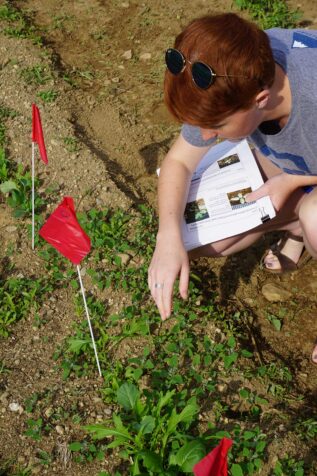School of Food and Agriculture one-credit short courses
SFA is now offering a variety of one-credit short courses. Courses are typically five-weeks long, offering students opportunities to learn about topics such as soil health, poultry production, cannabis cultivation, and more.
Why short courses?
Short courses provide focused opportunities for students to immerse in practical and current topics related to sustainable agriculture. Courses are taught by nationally and internationally recognized University of Maine instructors from both the School of Food and Agriculture and Cooperative Extension. Our faculty work regularly in their respective industries with farmers, land-owners, and businesses. A mixture of online and in person learning opportunities make these courses both accessible and practical.
See below for a summary of courses offered in upcoming semesters:
PSE 260: Pesticide applicator certification
Prepares students for careers in horticulture, agriculture, forestry, and biological sciences in which pesticides are applied. Students must pass two written exams and are expected to obtain a private applicator license for the state of Maine. Students who enroll for a second semester must pass two commodity exams to earn another credit for the course.
Next offering Fall 2023 (in person) – Dr. Bryan Peterson, Associate Professor of environmental horticulture
PSE 262: Introduction to cannabis cultivation
The purpose of this course is to teach students about cannabis cultivation and prepare students for possible work in the cannabis field. The course will cover the history of cannabis, botany, production requirements, pest management, fertility, legal aspects, production of cannabis products, and uses of both high and low THC cannabis.
PSE 265: Soil health for farm resilience and climate mitigation
This course provides students with tools to understand the concepts and practices of soil health in different scales and types of systems. The importance, goals, and challenges of managing for soil health are emphasized. Both agronomic and environmental outcomes for soil health practices are considered. Students will build their understanding of, and ability to use, course information through weekly discussions and will critically evaluate the use of soil health practices for climate mitigation.
Next offering Fall 2023 (in person) – Dr. Ellen Mallory, Extension Professor of sustainable agriculture
PSE 266: Small fruit and berry production
This course is an introduction to growing berries and small fruit, including strawberries, raspberries, highbush blueberries, and grapes. The course covers economics, site selection, soil preparation, varieties, planting and establishment, fertility requirements, pruning, harvest and pest problems through lectures, hands-on demonstrations, and one field trip to observe established planting.
Next offering Fall 2023 (in person) – Dr. David Handley, Vegetable and small fruit specialist
AVS 268: Pasture poultry production
Students will be introduced to the scientific fundamentals of small-scale and pastured poultry production, including nutrition, genetics, reproduction, health, management, marketing and current topics including food safety, animal welfare and sustainable agriculture.
Next offering Fall 2023 (in person) – Dr. Colt Knight, Assistant Extension Professor and state livestock specialist
PSE 270: Wild Blueberry Production
The course is offered every other fall in even years. – Dr. Lily Calderwood, Extension Wild Blueberry Specialist Assistant Professor of Horticulture
Current students can get more information about courses, including required prerequisites, by searching in Maine Street. Sustainable Agriculture Majors are required to take four or more short-courses prior to graduation.
For more information, contact Charlene Gray at charlene.gray@maine.edu

